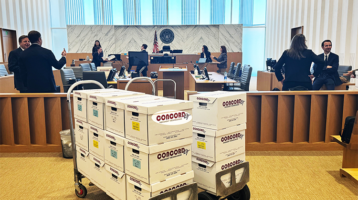You Can Run, But You Cant Hide From Sanctions in Discovery
In a recent ruling in a patent infringement case, a federal magistrate judge refused to grant a consent motion that would vacate the sanctions he previously ordered and let the plaintiff “hide [its] discovery abuse.
In an October 2013 order in Digital Vending Services International, Inc. v. University of Phoenix, the judge refused to grant the defendants request for spoliation sanctions but punished the plaintiff for its disclosure of more than 7,000 new documents after the close of discovery. In evaluating whether this failure to timely supplement under Federal Rule of Civil Procedure 26(e) merited sanctions, the judge considered five factors:
- the surprise to the party against whom the evidence would be offered;
- the ability of that party to cure the surprise;
- the extent to which allowing the evidence would disrupt the trial;
- the importance of the evidence; and
- the nondisclosing partys explanation for its failure to disclose the evidence.
The judge disagreed with the plaintiffs assertion that it supplemented the disclosures upon the discovery of these documents. He found the plaintiff offered unbelievable reasons for the failure to disclose that may rise to the level of perjury, particularly given the plaintiffs mission to safeguard intellectual property. The plaintiffs CEO repeatedly argued that documents did not exist and colluded with a shareholder not to produce documents in response to a subpoena on the assumption they were duplicative, which showed an overall lack of concern about the integrity of the discovery process. Furthermore, the late disclosure disrupted the trial and prevented the defendants from using the information to depose the inventor of a competing product who passed away two years after the documents should have been produced testimony that could have changed the tenor of the lawsuit.
Given the surprise to the defendants and disruption to the trial schedule, the judge (1) prohibited DVSI from using the late-produced documents in the litigation; (2) required it to pay the defendants attorneys fees for the spoliation motion and for review of the late disclosures; (3) permitted the defendants to reinstate their defense for inequitable conduct; and (4) recommended that the district judge issue an adverse inference instruction at trial. Despite the parties settlement, the plaintiffs withdrawal of its appeal of the courts summary judgment decision, and the defendants withdrawal of their motion for discovery sanctions, the judge refused to vacate these sanctions.
As this case demonstrates, counsel should follow a rigorous document-collection plan that begins with interviews of all potential custodians and IT staff members. The interviews should confirm custodians compliance with the legal hold notice; locate data sources, including personal computers, mobile devices, portable media, and personal e-mail and social media accounts; identify other custodians who may have relevant information or documents; and assess potential privilege or work-product issues. Counsel should follow up on any inconsistencies in custodians answers. As the plaintiff learned in this case, “all things are presumed against a spoliator, and the failure to resolve any discrepancies can trigger heightened scrutiny during discovery.
At Concord, we provide secure solutions for your clients.


